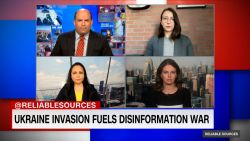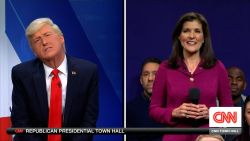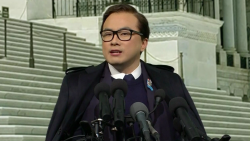A version of this article first appeared in the “Reliable Sources” newsletter. You can sign up for free right here.
On Wednesday morning, as Russia’s unprovoked war on Ukraine entered its seventh day, I turned on RT, the Russia-controlled network that has in recent days been banned in Europe and dropped by television carriers across the world. Founded in 2005, RT, which operates multiple channels, including RT America, has served as one of Russian President Vladimir Putin’s largest megaphones across the world. It offers insight into how the Kremlin would like to portray the world and its role in it.
For several hours I watched the channel and was struck by how brazenly its hosts and personalities worked to mislead its audience and deflect from the issues at hand. The main thrust of RT’s coverage presented Russia as a mere victim of western aggression, a country forced to launch a limited “military operation” after its hand was forced by a high-and-mighty NATO that showed no interest in taking Moscow’s security concerns seriously.
Here’s a breakdown of what I observed on the network.
Russia the “liberator”
Peter John Lavelle, the host of RT’s signature talk program, “Crosstalk,” put it like this: He said that the failed “liberal order” implemented by the West was to blame. “It is so irritating,” Lavelle said on his show. “The way it is being framed: Ukraine’s democracy. Well, it has nothing to do with Ukraine’s democracy — if you can say it even has one… This is about security… There is only security for other countries.”
On its news programs throughout the day, RT’s on-screen graphics blared breaking news alerts supporting that notion: “RUSSIA: NATIONAL SECURITY THREATS LEFT NO CHOICE BUT TO START MILITARY OPERATION.” Another chyron read, “RUSSIA SAYS ITS GOALS IN UKRAINE TO DEMILITARIZE & DENAZIFY THE COUNTRY.”
In fact, according to RT, Russia wasn’t even necessarily the aggressor. The channel at times said that Russia was a “liberator,” essentially freeing people from the menacing forces in Kyiv. “MILITIA SAYS 40 TOWNS AND VILLAGES NOW LIBERATED IN CURRENT OFFENSIVE,” a chyron declared.
One package the network repeatedly ran characterized life under Ukraine as unbearable for those who lived in the Lugansk region. In another package, RT focused on damages to residential buildings in the Donetsk region.
Missing from coverage
Noticeably left out of the coverage was a focus on how unbearable life has been for Ukrainians whose cities are under attack by unrelenting Russian forces. I did not see much coverage showing the damage that Russian forces have caused as they try to seize control of the country. Or coverage about the residents of cities such as Kyiv who live in terror and sleep underground in bomb shelters. Or coverage about the hundreds of thousands who have simply chosen to flee the country for their safety. Those inconvenient facts were not the emphasis of the narrative RT pushed.
>> Also left out of RT’s coverage: The ramifications the West’s sanctions and other actions are having on Russia’s economy.
Other areas of focus
While RT turned a blind eye to inconvenient facts, it did find time to portray Russians who aren’t even in the war zone as the victims. One segment focused on how Russians “face hostility in western countries” over the “situation” in Ukraine. It quoted a man in the UK who said that he is “not ashamed” to say he is Russian, but “afraid” and “worried that society will have this perception that all Russians are bad.”
At other times, RT aimed to portray Russia as a country that cares deeply about humanitarian issues. The network aired a story on how Russia has welcomed school kids displaced by the war: “RUSSIAN SCHOOLS WELCOME HUNDREDS OF SCHOOLCHILDREN FROM DONBASS.” To the backdrop of uplifting music, the segment featured interviews with several children expressing how thankful they were and saying Russia is willing to welcome many more kids.
Real-world consequences
RT is being choked from public discourse now that Russia has invaded Ukraine and its role in promoting the Kremlin’s dishonest talking points has been exposed. But the outlet’s propaganda aired across the world unfettered for years and years, coloring the minds of untold numbers of people, many who distrust western news organizations. It’s a shame that it takes a war to get corporations to realize that the programming they beam into homes does matter. Russia’s real-world war started last week, but it’s information war started long before then. Imagine if these companies had acted sooner how things might be different.
Further reading
– The RT resignations continue: “Maria Baronova, the editor in chief of RT’s Russian-language edition, said she resigned from the outlet in an interview with news outlet Znak,” Aidan McLaughlin reports. (Mediaite)
– “The Russian invasion is clearly making headlines globally — but how it is being portrayed by the media in East and West, is a different conversation altogether,” writes Rezwana Manjur. (Marketing)
– Evelyn Cheng examines “how Chinese media is covering Ukraine.” She notes that state media has used the term “special military operations.” (CNBC)

























